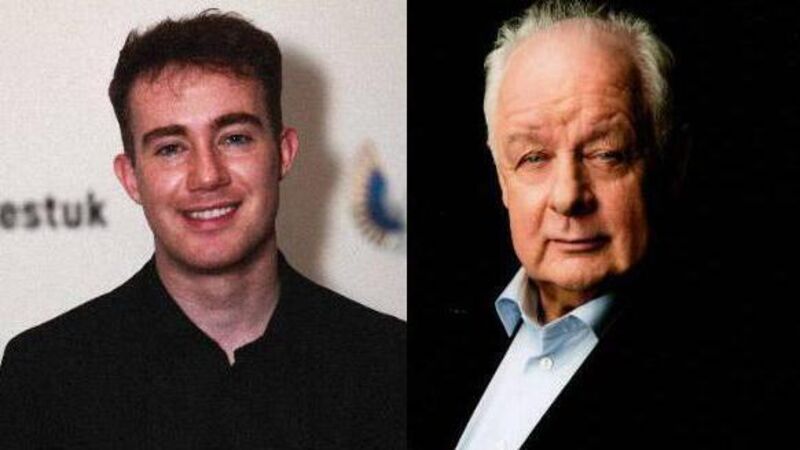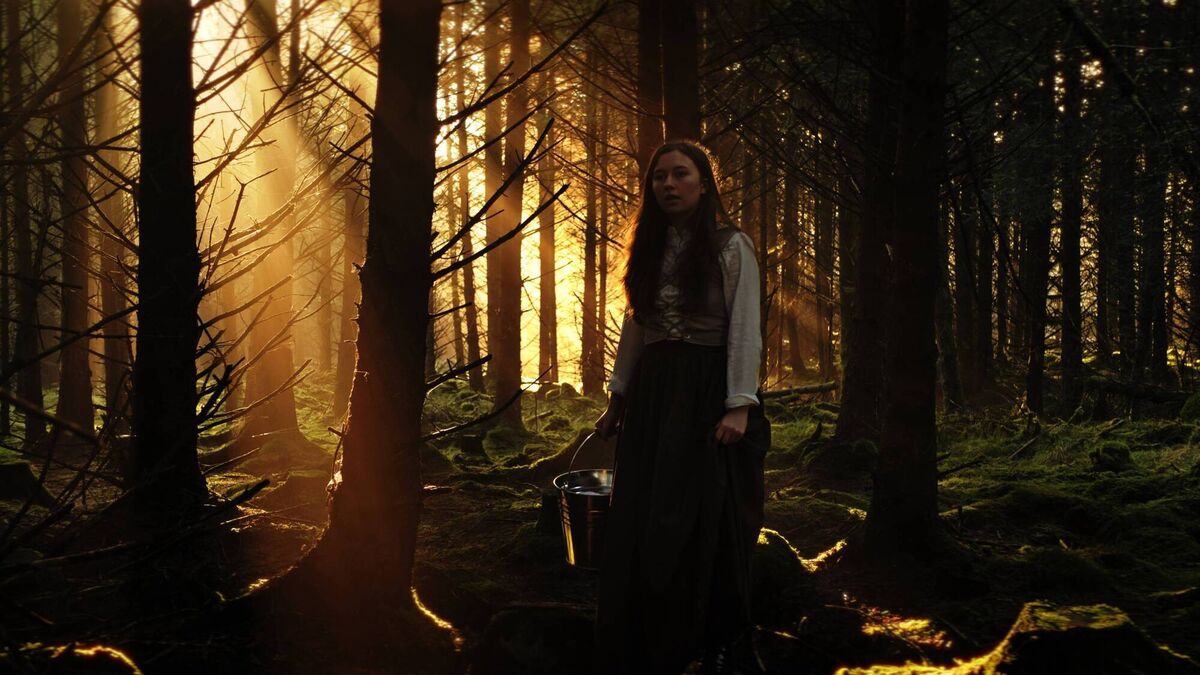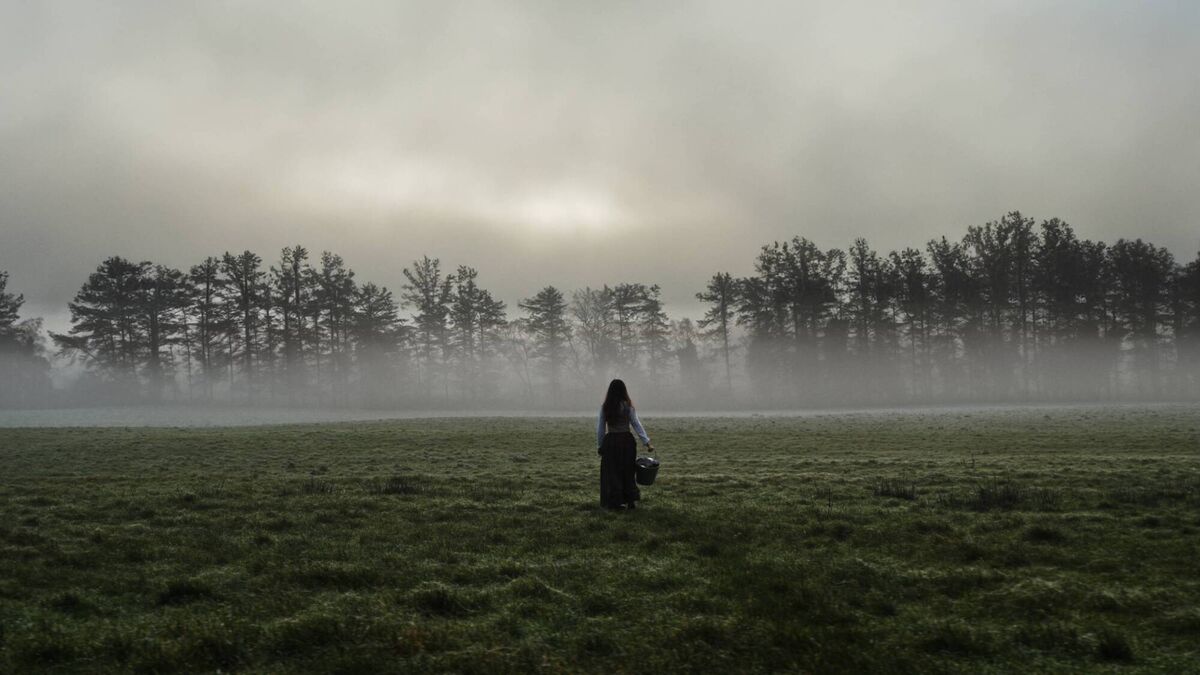Meet the talented young director working with Jim Sheridan on the first Irish-language horror film

An Taibhse director John Farrelly and executive producer Jim Sheridan.
It’s the Irish-language horror movie that was made on a tiny budget of just €3,000. Young filmmaker John Farrelly used his own savings to get (The Ghost) made - and the resulting thriller caught the eye of one of Ireland’s best-known filmmakers.
director Jim Sheridan was impressed by an early rough-cut screening of the film. He came on board as executive producer and offered advice to Farrelly as he developed the final film.
“It had a concept,” says Sheridan. “It was a post-Famine concept about the results of Famine. The minute you see a movie, you know if it's good or not. The minute I saw this I thought: yeah, this is really good.”
What would he say to audiences who are thinking about going to see this film? “I’d say it's well worth a trip. You'll be able to say you saw this guy's first film, because I have no doubt he's making other ones.”
Irish-language cinema is having a moment, with genre films such as horror now entering the conversation. Another horror in the Irish language, , opens in cinemas here next month having built strong word of mouth on the festival circuit.
“Horror is one of the few movies that people still go to the cinema to see,” says Sheridan. “Blumhouse have built a whole company on making horror. And they're not easy to do. It's not easy to scare people. There’s a bit of a buzz about Irish films now. It’s come on in leaps and bounds and you have and - they’re great movies.”
For 24-year-old filmmaker Farrelly, getting the support of Sheridan was a great encouragement. “He is one of my heroes from a young age, seeing for the first time, being blown away by the story. I always looked up to him and to have him on board, it was surreal. A friend of mine did catering for one of his films and told him about me and the film I was working on, and said you should meet him for a chat."

What started off as a conversation over some food, led to a chat about the film. "At that point, we had a really rough first cut that was around two hours, and he came along to a little private screening that we did at that first cut,” he said, adding that Sheridan suggested he cut the film to approximately 90 minutes - a popular running time in the horror genre.
“His advice and feedback was invaluable. We kept working on the film and then we got to the place where it is now. What's really magical is audience members from all over the world are connecting with the story and with the language. The film has played in Iceland, Brazil, Argentina, South Africa. All over the world, people are hearing the Irish language. A lot of people said it was their first time hearing it. They thought that it really helped immerse them in the story.”
Set in post-Famine Ireland, An Taibhse centres around Éamon (Tom Kerrisk) and his daughter Máire (Livvy Hill), who take on the task of maintaining a remote mansion , only to be driven to the edge of sanity by the horrors lurking within. The film is Farrelly’s second feature, following his debut feature .
The film from the Drogheda-born director originally started life as a university project, before Farrelly developed it into a feature. He used €3,000 of his own savings on accommodation and food, with others working on the film for a deferred payment.
“We were as resourceful as possible, and we didn't have a big, fancy light to use. We had to utilise the actual sun. Wherever the sun was in the sky, we would film around it. We didn't just shoot location by location in the house or out in the exteriors. We just followed the sun to make sure the sun was back lighting every single thing. Those limitations, I don't think they hindered the production, it made us more creative. It made us think of more creative ways to shoot these scenes.”

Farrelly attended an Irish-language primary school and as a boy, became immersed in the world of filmmaking. As a child, he started off making animations using Microsoft Paint, and then used his dad's camcorder to film short films for YouTube with his friends and family.
“One day, my mum told me about the Fresh Film Festival, a youth film festival held every year for young filmmakers. I started entering my short films into that and that was great as a motivator to keep improving, to see the film in the film festival up on a cinema screen. At 11 or 12 years old, it's amazing to be able to see the film in the cinema.”
As he started developing this film, he felt a desire to return to his Irish-language roots. “I wanted to make it in Irish for two reasons. I grew up speaking Irish and I loved speaking the language. A lot of the cast and crew were passionate gaeilgoirs so I thought it would be nice to make a film in our language.
“I wanted to make the film as immersive as possible, authentic and real. Because it is set in a time when Irish was widely spoken, I wanted to see through that time period. I wasn't too afraid of losing audience members, because it was in subtitles for a lot of international audiences. With the rise of foreign language films like , for example, in the Oscars, there is a demand for films of all languages and from all countries.”
The young filmmaker is already in the early stages of working on a number of forthcoming projects, including a coming-of-age romance set on the Aran Islands.
Following a well-received run at international film festivals, Farrelly is excited at the prospect of releasing independently in Irish cinemas. “It doesn't feel real yet. Whenever we started this project, we had no idea where it was going to go. We're just extremely grateful and humbled by the response from the film festivals and now that it's going to the cinema. More and more films are going in cinemas, and people are going out to watch them. I think that's a beautiful thing.”
- opens in cinemas from March 28.


